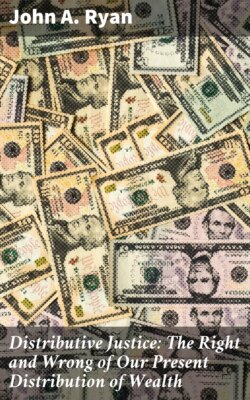Читать книгу Distributive Justice: The Right and Wrong of Our Present Distribution of Wealth - John A. Ryan - Страница 10
На сайте Литреса книга снята с продажи.
CHAPTER II
LANDOWNERSHIP IN HISTORY
ОглавлениеTable of Contents
Thirty or thirty-five years ago, the majority of economic historians seemed to accept the theory that land was originally owned in common.[1] They held that in the beginning the community, usually a village community, was the landowner; that the community either cultivated the land as a corporation, and distributed the product among the individual members, or periodically divided the land among the social units, and permitted the latter to cultivate their allotments separately. The second of these forms of tenure was the more general. The primitive time to which the theory referred was not the period when men got their living by hunting and fishing, or by rearing herds, but the agricultural stage of economic development, when life had become settled. Of the arguments upon which the theory was based, some consisted of ambiguous statements by ancient writers, such as Plato, Cæsar, and Tacitus, and others were merely inferences drawn from the existence of certain agrarian institutions: family ownership of land; common pasture lands and woodlands; periodical distribution of land among the cultivators, as in the German Mark, the Russian Mir, the Slavonic Zadruga, and the Javanese Dessa. All these practices have been interpreted as "survivals" of primitive common ownership. Only on this hypothesis, it is argued, can they be satisfactorily explained.
More recent writers have subjected the various arguments for this theory to a searching criticism.[2] To-day the great majority of scholars would undoubtedly accept the conclusion of Fustel de Coulanges, that the arguments and evidence are not sufficient to prove that in the earliest stages of agricultural life land was held in common; and a majority would probably take the more positive ground that common ownership in the sense of communal cultivation and distribution, never existed for any considerable length of time among any agricultural people. The present authoritative opinion on the subject is thus summarized by Professor Ashley:
"From the earliest historical times, in Gaul and Germany, very much land was owned individually, and wealth on one side and slavery on the other were always very important factors in the situation.
"Even in Germany, communal ownership of land was never a fundamental or generally pervasive social institution; there was something very much like large private estates, worked by dependents and slaves, from the very earliest days of Teutonic Settlement.
"As to England, it is highly probable that we shall not find anything that can fairly be called a general communal system of landowning, combined with a substantial equality among the majority of the people, under conditions of settled agriculture. To find it in any sense we shall have to go back to an earlier and 'tribal' condition, if, indeed, we shall find it there!"[3]
